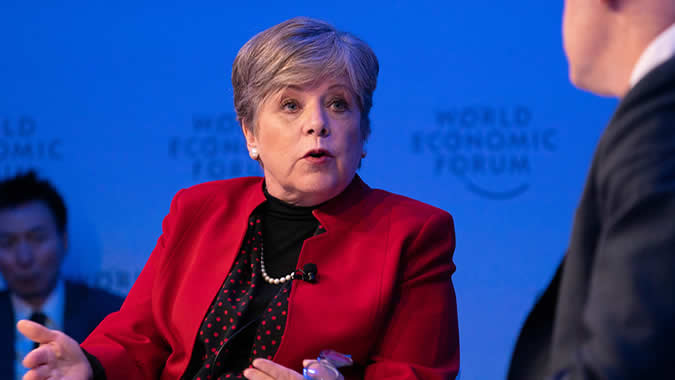Briefing note
The Executive Secretary of the Economic Commission for Latin America and the Caribbean (ECLAC), Alicia Bárcena, emphasized today in Davos, Switzerland the key role of public, private and foreign direct investment for bolstering productive diversification, infrastructure, and the integration of countries in the region.
In the context of her participation in the annual meeting of the World Economic Forum (WEF), the senior United Nations official spoke at a session entitled Strategic Outlook: Emerging Markets on the outlook for emerging markets in 2020, where she presented an economic and social overview of the region.
The other members of the panel included Mohammad Al Tuwaijri, Minister of Economy and Planning of Saudi Arabia; Jin Keyu, a professor at the London School of Economics and Political Science; and Bill Winters, Chief Executive of Standard Chartered Bank. The session was moderated by journalist Thorold Barker, an editor at The Wall Street Journal and Dow Jones.
In her remarks, Alicia Bárcena spoke of the high impact that trade tensions between China and the United States have had on the region, noting that these two countries are Latin America’s main trading partners. She indicated that while the impact is seen in commodities prices, it also evidenced in overall trade: exports have fallen 3% and imports 5%.
In addition, ECLAC’s Executive Secretary addressed the origins of the social disenchantment being felt in the region, which represents the breaking point of a model associated with three decades of wealth concentration, combined with insufficient growth.
With regard to this, she indicated that the reigning model’s lack of legitimacy is mainly affecting young people, who are expressing their despondency about the future.
“That is why we must move towards a new development paradigm that would take economic growth into account, establish equality as the driver of that growth, and be sustainable. This is about growing to equalize, and equalizing to grow,” she stated.
Alicia Bárcena also stressed the importance of addressing the migratory problem affecting Central America, the United States and Mexico.
In that sense, she highlighted the Comprehensive Development Plan for El Salvador, Guatemala, Honduras and south-southeast Mexico, and underscored the important role that the private sector can play in development with equality in a region like Central America, where the 10% of the population with the highest income obtains as much as 70 times more than the poorest 10%.
“We need ambition and clear objectives to transform migration into an option, rather than an obligation,” she said.
The participation of ECLAC’s Executive Secretary in the meeting in Davos continued today with diverse public and private activities.
Meanwhile, on Thursday, January 23, she will moderate the Country Strategy Dialogue on Mexico, where she will explain the scope of the Comprehensive Development Plan for northern Central America and south-southeastern Mexico.
In addition, she will participate in a session entitled How to Turn Protest into Progress, where she will refer to the antigovernment protests that have taken place in some countries of the region and the world against entrenched inequality, corruption and political repression, and to how social movements can move from protest to political change in an effective way.



